“Mom, will you read me a book?” My son utters these words numerous times per day, every day, and though the timing isn’t always right, it’s a request I never tire of hearing and one that I indulge whenever possible. Because I believe that, apart from cultivating Charleston’s relationship with Jesus, reading with him is one of the most important things—if not the most important thing—I can do for him as his mom.
I recognize the boldness of that statement. And I realize that I may be a tad biased as a bibliophile myself. But as a former teacher, and now parent, I’ve witnessed the benefits of parent/child read-alouds. Here are just a few of the reasons WHY I place such a high value on reading aloud.
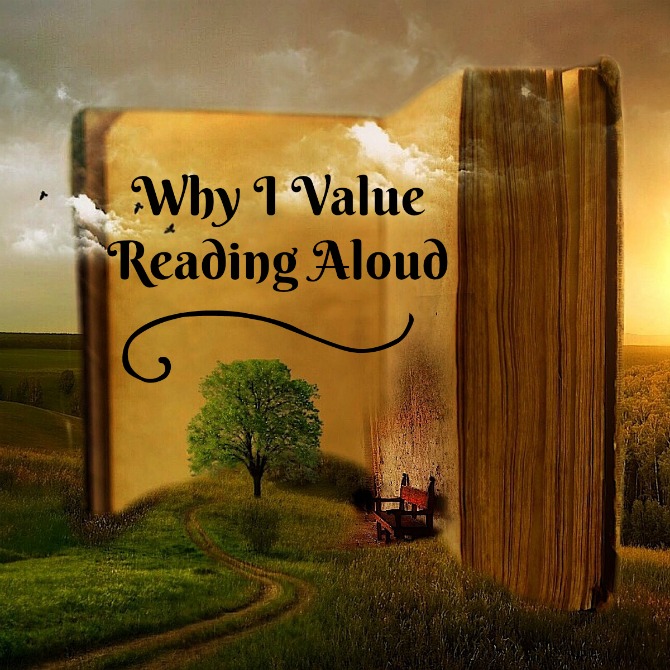
1. Reading aloud brings me back to my own childhood.
Some of my favorite memories revolve around books. From reading Goodnight Moon for the zillionth time before my Dad tucked me into bed, or snuggling next to my mom on the couch as we explored the prairie with Laura Ingalls Wilder, to sitting around the table with my family after dinner, laughing over the antics of Fudge and the rest of the Hatcher family. These memories are priceless and I want Charleston to have similar ones in his own memory bank.
2. Sharing a book provides an opportunity to connect with my child.
I’m not the best at playing with Charleston or giving him my undivided attention at other points throughout the day, but reading aloud to him forces me to be all in. As we read, we are both fully engaged in a common activity—one that we both enjoy.
3. Stories serve as a launching point for important conversations.
This is especially true now that Charleston is into more advanced books, and my hope is that our conversations will grow even deeper as he gets older. Charleston regularly asks questions about what we’re reading, and this has led to dialogue about everything from characters’ emotions and motivations to ideas about the afterlife.
4. Books open his eyes to new worlds and ideas, and help him understand important concepts.
Picture books have taken us to faraway countries, fantasy worlds, and even the hospital. I use books to help preview upcoming holidays, vacation spots, or family activities. Books have taught Charleston about animals, trucks, trains, and the importance of never answering your door for the Big Bad Wolf. We regularly borrow books based on movies he enjoys (our library has all the Disney books), and I find he has a much deeper understanding of the story after experiencing it in book form.
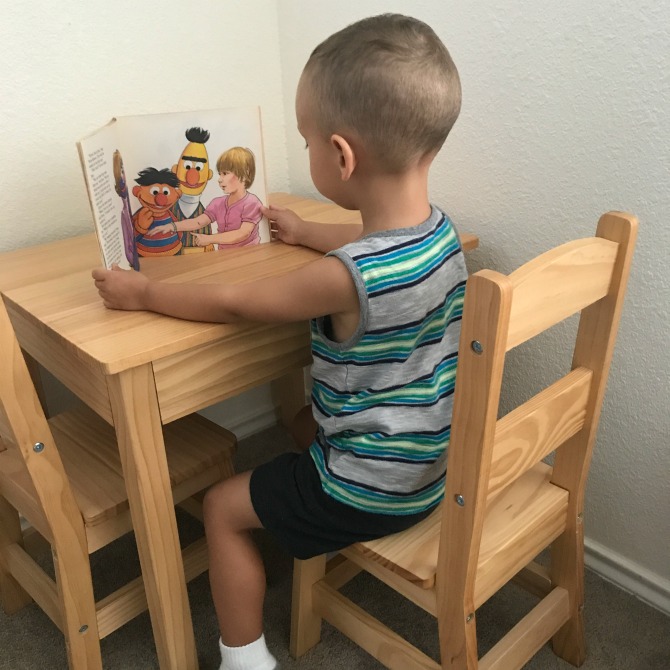
5. Reading aloud fuels his imagination.
Few things make me happier than hearing Charleston reenact a favorite story with his stuffed animals, or build upon a book we’ve read with some storytelling of his own. Experts have found that imagination fuels creativity and innovation, so this is definitely something worth cultivating.
6. Hearing me read aloud improves Charleston’s language and vocabulary skills.
Books expose children to more advanced dialogue and vocabulary than they would regularly hear in conversation, and this exposure leads to the advancement of their own language. The repetition and singsong patterns found in children’s books are also great for language acquisition and development. (I saw this firsthand when working with English learners when I taught Kindergarten—reading poetry aloud to them led to huge improvements in their English comprehension and their decoding skills.) I always chuckle when I hear Charleston use a word he recently picked up in a book, or compose a rhyme following a familiar pattern.
7. I am preparing Charleston to be a lifelong reader.
I want to instill a reading habit in Charleston, and until he is reading on his own, our shared books are his primary means of exercising those reading muscles. Reading along with me will (hopefully) help him learn how to read on his own (we’re already working on those preliteracy skills), and by ensuring that reading is an enjoyable activity, I’m modeling a healthy and rewarding reading life.
8. Reading together is fun!
Sharing books is an activity that Charleston and I both love. He enjoys hearing a good story and having Mom’s undivided attention, and I get a kick out of putting my theatrical reading skills to practice and seeing Charleston’s face light up with delight. Reading aloud is a fantastic boredom buster, plus it’s inexpensive, portable, and requires zero batteries or Wi-Fi access.
If you’re a parent who reads with your child, I’m sure you’ve reaped some of these rewards yourself. You may have even noticed some additional benefits that I didn’t list here. (If so, please tell me about them!) But if you’re just starting out on your read-aloud journey and would like some extra encouragement, I’d love to share some tips.
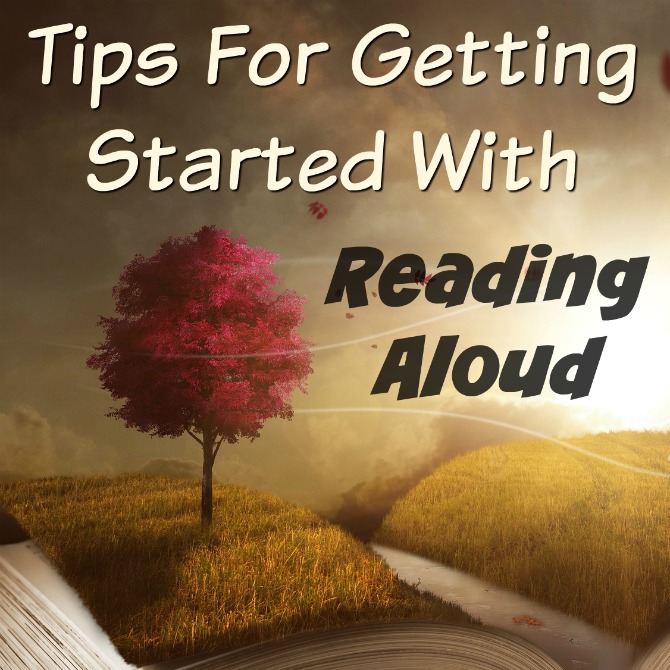
1. Fill your home with books.
I place ZERO limits on the number of children’s books I allow into our home. We have several bookshelves dedicated to picture books I kept with me from my own childhood, as well as the many books we’ve acquired since Charleston was born. Most of these books are not accessible to Charleston (having to ask for a book makes them even more enticing), but we do have a few piles of easily-accessed books around the house (I regularly rotate which books are kept out), as well as some open shelves that I reserve for seasonal books.
2. Make good use of your local library.
We visit our library at least once per week and check out about a dozen books each time. I enjoy my weekly treasure hunts through the Children’s stacks, but if you’re not sure which books to start with, ask your librarian, or begin by perusing the carts of recently-returned books for ideas on what other families are enjoying (I always have great luck with this). Also be sure to check out your library’s story time for an alternate type of read-aloud experience.
3. Find books that your child loves.
This is crucial! If your child doesn’t like the books you’re offering, he or she won’t want to read. I have a friend whose son hated reading with her. I gave her a set of Mo Willems’ Pigeon books, and they did the trick—now her son begs her to read them to him every night. This is where the library is your best friend: check out a variety of titles, even ones you don’t know if your child will like, and keep trying until you’ve found a winner. Then use that book as a launching point for finding other, similar titles. If you’d like some personalized suggestions, I’D BE HAPPY TO HELP! Shoot me an email or leave a comment below, and I’ll help get you started with some books that are a good fit for you and your child.
4. Fit in reading time wherever you can.
Most families think of bedtime as prime read-aloud time, but books don’t have to be reserved for nighttime hours. We do most of our reading after meals (I tend to eat faster than Charleston and read to him once I’ve finished my own food). You can also try reading aloud while your child engages in another tactile activity, such as building with blocks or coloring. Or read together during wait times at the doctor, during bath time, or as a break from playing while at the park. I’ve found it best to go in without expectations; we don’t always finish a book that we start, and Charleston isn’t always as engaged as I wish he would be. And that’s okay! Imperfect reading time is better than no reading time.
5. Remember that reading aloud isn’t just for young children.
Everyone enjoys being read to. (Why do you think audiobooks are so popular?) Many parents stop reading to their kids once their children can read on their own, but I think that’s a big mistake! Reading aloud to older kids gives them access to books that exceed their reading level, and offers conversation opportunities about complex issues. My parents and I read together well into my college years, and I plan to read aloud to Charleston for as long as he’ll let me.
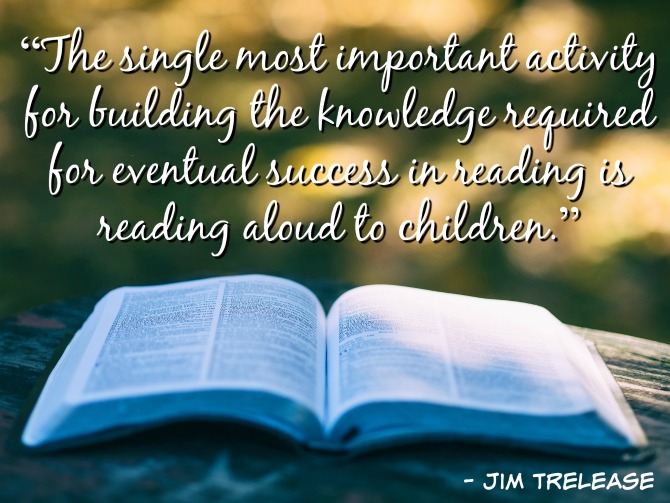
If you’re looking to improve the reading culture in your home, there are a number of great resources to help you on your journey. These are a few of my favorites:
- The Read Aloud Handbook, by Jim Trelease: I read this for a Children’s Literacy course I took in college and it’s one of the few textbooks I’ll never part with.
- The Book Whisperer: Awakening the Inner Reader in Every Child, by Donalyn Miller: A teacher’s inspiring experience of instilling a love of reading in her students. Great for teachers AND parents.
- Give Your Child the World: Raising Globally Minded Kids One Book at a Time, by Jamie C. Martin: A curated list of the best literature from around the world.
- The Read Aloud Family, by Sarah Mackenzie: Sarah is the read-aloud guru. I adored this book!
- Read-Aloud Revival Podcast: This is also from Sarah Mackenzie. The podcast offers great read-aloud tips, author interviews, and tons of excellent book suggestions.
Do you enjoy reading aloud with your child? If so, what are your best tips and favorite books? What’s your Why? And if not—how can I help you? This is clearly a pet topic of mine and I’d love to get you and your family started on your own reading journey!
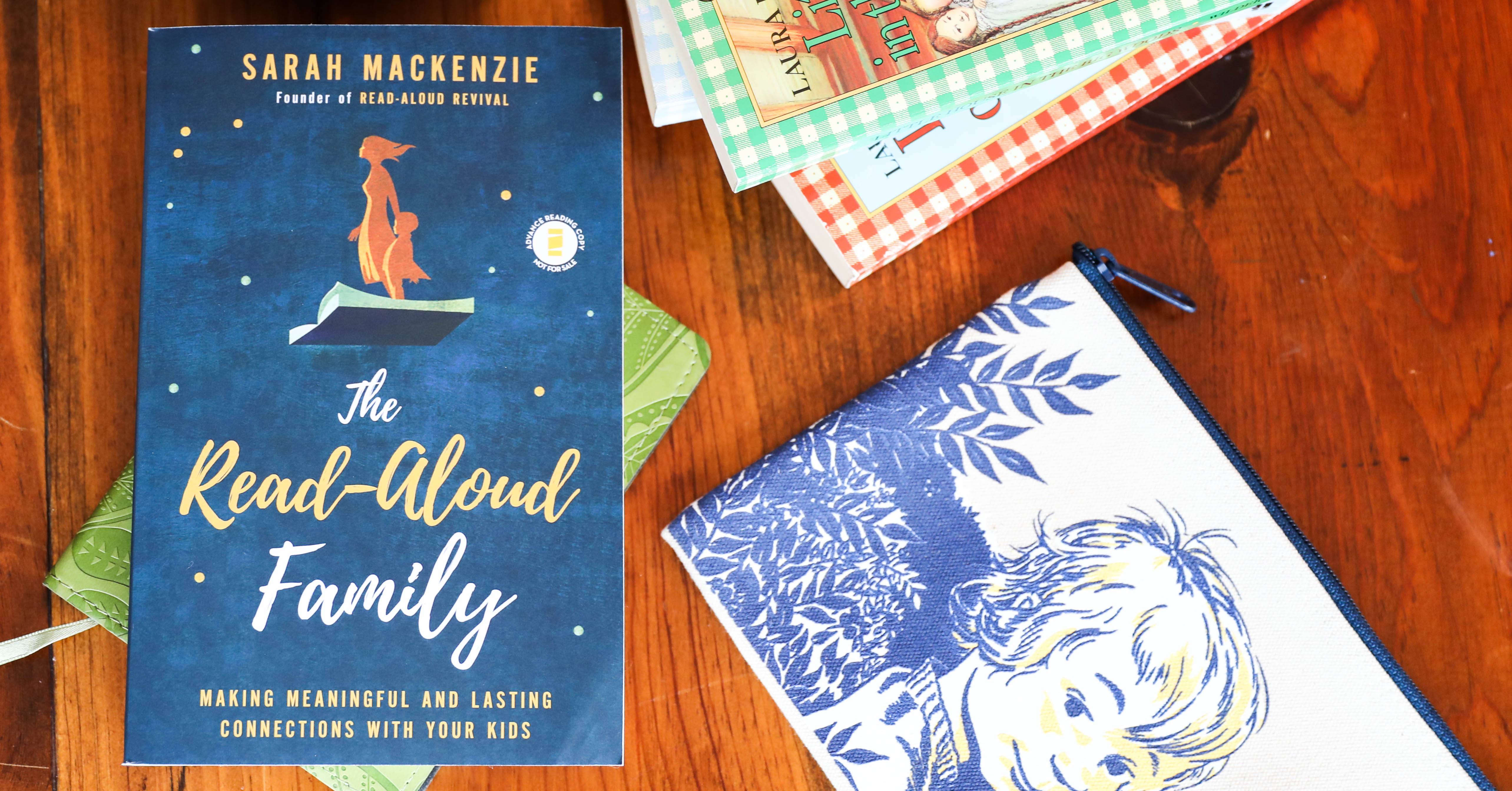
[…] Why I Value Reading Aloud ~ The “Why” behind the emphasis I place on reading with Charleston, as well as all of my best tips for creating a read-aloud culture in your family. […]